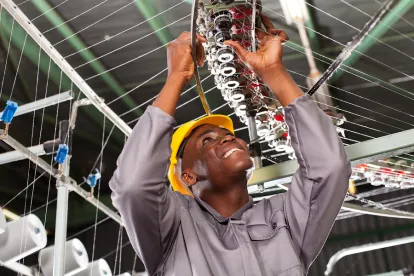Life under the COVID-19 pandemic is sometimes described as the “New Normal.” However, the New Normal keeps changing. Cases and hotspots move around the country. Guidance from federal, state, and local bodies is updated frequently.
The Centers for Disease Control and Prevention, Occupational Safety and Health Administration, and state health departments continually reiterate what many manufacturers already know. Manufacturers face special challenges. Employees may work in close contact with other employees for extended periods. Spaces, equipment, and common areas are shared. Shift schedules often bring employees in and out of the plant together. Handwashing and hygiene pose special challenges but are very important in industrial spaces.
Manufacturers can develop a system of best practices, communicate them, and enforce them. Indeed, many states require them. Any best practice should be customized to the company and comply with local and state orders. However, nearly all manufacturers should consider the following:
-
Develop a written plan and communicate it;
-
Ensure management endorses it;
-
Revise it as needed; and
-
Discipline those who do not comply, especially where such non-compliance is intentional, knowing, or reckless.
The “devil is in the details.” Some of those details include (but are not limited to):
-
Seeking to ensure social distancing (at least six feet between employees) or the use of barriers or shields.
-
Requiring mask wearing where possible. It is sometimes unpopular but is increasingly required by state or local law and nearly always important.
-
Avoiding crowding at work: Provide for staggered shifts and having employees who can work from home, work from home.
-
Controlling access of visitors and reviewing shipping and receiving practices, and limiting travel and in-person meetings.
-
Keeping sick workers at home through prework screening and self-reporting at work, sending workers with symptoms home, and notifying nearby coworkers if an employee shows symptoms at work or tests positive. Ensuring special disinfection as required and regular sanitization.
-
Distributing hand sanitizer and additional necessary personal protective equipment where needed. This can be difficult in a large manufacturing plant.
-
Developing written work rules or policies with disciplinary penalties, especially for willful, knowing, or reckless behavior.
Manufacturing is hard work and is often less social than many other jobs. It is sometimes dangerous. Employees may not always have the same sense of engagement with management or even other employees outside their immediate shift and department as in some workplaces. Yet, the whole operation relies on interdependence and efficiency.
In manufacturing, it is particularly important to develop a plan, communicate the plan, and to ensure that both front-line and senior management endorse and enforce the plan and that employees follow it.




 />i
/>i
